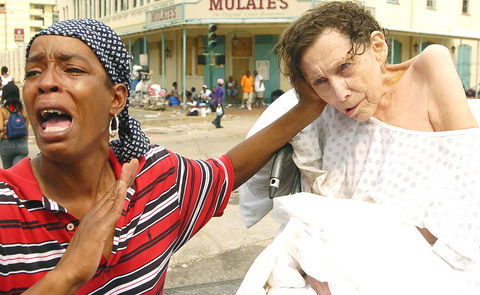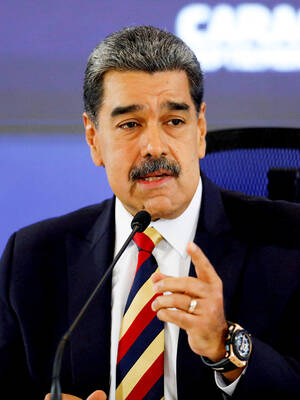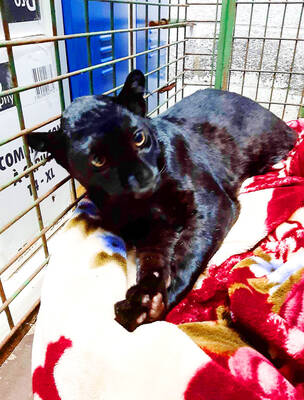The New Orleans Superdome was meant to be a hurricane refuge, but those who sought shelter there described a lawless "concentration camp" where two children were reportedly raped and other refugees terrorized by rioters.
"The last few days were utter hell," said Baron Duncan, 42, one of many thousands who sought protection in the giant sports arena when Hurricane Katrina hit the US Gulf Coast on Monday.
By Thursday, thousands were still waiting for buses to take them to Houston, Texas, their relief at finally leaving the stadium mixed with outrage at their treatment.

PHOTO: AP
For some, the four days without proper food, water, sanitation and nights of lawless blackout had clearly taken a heavy physical and mental toll.
Many broke down in tears, while other just lay prostrate on the ground, too exhausted to move, as National Guardsmen, police and medical personnel carried infants, the elderly and the sick to air-conditioned buses.
Those still waiting in line passed babies to the front of the queue so guardsmen could give them water.
One 13-year veteran of the New Orleans police force said he and other officers who had been at the Superdome since Sunday were outraged at what they saw as a lack of preparation that allowed the situation in the covered stadium to deteriorate so badly and so quickly.
"This city knew something like this would happen a long time ago. They did nothing to prepare for this. They just rolled the dice and hoped for the best," said the officer, who asked not to be identified.
"People were raped in there. People were killed in there. We had multiple riots," he said, adding there was no way to police the mass of up to 20,000 people suddenly thrown together in such a confined space and such horrific conditions.
"You can't be trapped in there for so long without going crazy. People were locked in the dome like prisoners," he said. "There was no ventilation. We had 80-, 90-year-old people who needed medication and couldn't get it."
Duncan said the nights inside the arena were the worst, with the pitch darkness and debilitating humidity accentuating the rank smell from backed up toilets.
"The stench was unbearable. We were treated like animals," Duncan said. "There was shooting ... our lives were in danger. A seven-year-old girl and an eight-year-old boy got raped."
Norma Blanco Johnson, waiting for a bus with her daughter and infant granddaughter, said her main concern was her three sons, who she hadn't seen since before the hurricane hit.
"I don't know what happened to them," Johnson said, adding that her anxiety and fear had only been multiplied by the experience of sheltering in the Superdome.
"This was no way to treat a human being. I lost everything and then I went through hell. I have no place left. I have nowhere to go and all I have are these," she said, pointing to her soiled clothes.
Audrey Jordan vented her anger at New Orleans officials, saying they had known for years that a hurricane of Katrina's intensity could cause a breach in the low-lying city's water defenses.
"They wanted to pay millions of dollars to rebuild a stadium, but they couldn't even fix the levee," Jordan said.
"We were treated like this was a concentration camp," she said of the Superdome. "One man couldn't take it. He jumped over the railing and died."

China on Monday announced its first ever sanctions against an individual Japanese lawmaker, targeting China-born Hei Seki for “spreading fallacies” on issues such as Taiwan, Hong Kong and disputed islands, prompting a protest from Tokyo. Beijing has an ongoing spat with Tokyo over islands in the East China Sea claimed by both countries, and considers foreign criticism on sensitive political topics to be acts of interference. Seki, a naturalised Japanese citizen, “spread false information, colluded with Japanese anti-China forces, and wantonly attacked and smeared China”, foreign ministry spokesman Lin Jian told reporters on Monday. “For his own selfish interests, (Seki)

VENEZUELAN ACTION: Marco Rubio said that previous US interdiction efforts have not stemmed the flow of illicit drugs into the US and that ‘blowing them up’ would US President Donald Trump on Wednesday justified a lethal military strike that his administration said was carried out a day earlier against a Venezuelan gang as a necessary effort by the US to send a message to Latin American cartels. Asked why the military did not instead interdict the vessel and capture those on board, Trump said that the operation would cause drug smugglers to think twice about trying to move drugs into the US. “There was massive amounts of drugs coming into our country to kill a lot of people and everybody fully understands that,” Trump said while hosting Polish President

Japan yesterday heralded the coming-of-age of Japanese Prince Hisahito with an elaborate ceremony at the Imperial Palace, where a succession crisis is brewing. The nephew of Japanese Emperor Naruhito, Hisahito received a black silk-and-lacquer crown at the ceremony, which marks the beginning of his royal adult life. “Thank you very much for bestowing the crown today at the coming-of-age ceremony,” Hisahito said. “I will fulfill my duties, being aware of my responsibilities as an adult member of the imperial family.” Although the emperor has a daughter — Princess Aiko — the 23-year-old has been sidelined by the royal family’s male-only

A French couple kept Louise, a playful black panther, in an apartment in northern France, triggering panic when she was spotted roaming nearby rooftops. The pair were were handed suspended jail sentences on Thursday for illegally keeping a wild animal, despite protesting that they saw Louise as their baby. The ruling follows a September 2019 incident when the months-old feline was seen roaming a rooftop in Armentieres after slipping out of the couple’s window. Authorities captured the panther by sedating her with anesthetic darts after she entered a home. No injuries were reported during the animal’s time on the loose. The court in the